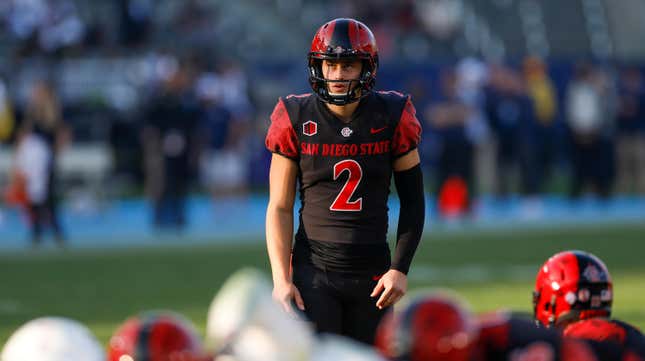Buffalo Bills Dismissed ‘Punt God’ Rookie Accused of Gang Raping a Teenager
The team dismissed Matt Araiza after a 17-year-old publicly sued him. Why was he even allowed to enter the NFL draft, six months after she reported the rape?
EntertainmentEntertainment

On Saturday, the Buffalo Bills cut rookie punter Matt Araiza, two days after he was publicly accused of raping a 17-year-old girl. On the surface, it appears the Bills, and by association, the NFL (a notoriously abysmal environment for women), have shockingly done the right thing. But the details and timelines of Araiza’s case are much more complicated—and suspicious—than the Bills’ seemingly swift dismissal might suggest.
The lawsuit filed last week alleges that Araiza, who was on the San Diego State football team at the time, and two of his teammates gang raped the then-high school senior (called “Jane Doe” in the suit) at a house party in October of last year, while she was “observably intoxicated,” coming in and out of consciousness. Araiza has denied the allegations through representatives. And, despite an investigation by the San Diego Police Department and a Title IX report from SDSU, his name had not been publicly connected to the allegations until the recent lawsuit.
In explaining the decision to release the man formerly dubbed the “Punt God,” Bills General Manager Brandon Beane told reporters that the culture of their team and of their city was more important than “winning football games.” “The last 48 hours have been very difficult for a lot of people,” Beane added. “It’s been tough. And we sympathize with this whole situation, all the parties involved, this young woman, what she went through. Really feel bad for that whole situation. Ultimately this a legal situation, we don’t know all the facts and that’s what makes it hard.”
Initially, it looks as though the Buffalo Bills did something most NFL teams can’t even fathom: the right thing. Many fans even patted the team on the back for their swift dismissal of the alleged rapist, myself included. But taking a closer look at the timeline of all this, I’m realizing that the fact that Araiza was even allowed to enter the 2022 draft in April of this year—six months after the teenager reported the incident to the San Diego Police and the school’s Title X office, according to the Los Angeles Times—suggests that a handful of institutions failed to bring a teenager to justice while allowing her alleged rapist to land a coveted spot in a league watched by up to 208 million Americans.
-

-

-

-

-

-

-

-

-

-

-

-

-

-

-

-

-

-

-

-

-

-

-

-

-

-

-

-

-

-

-

-

-

-

-

-

-

-

-

-








































